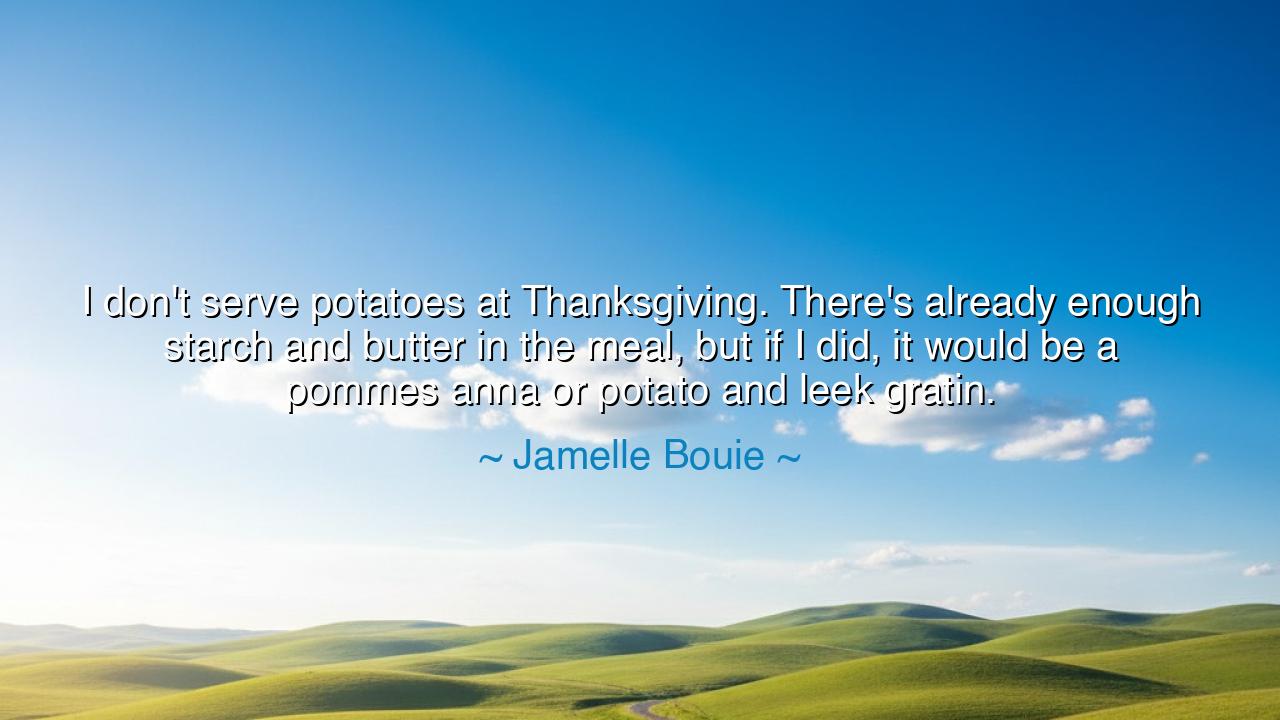
I don't serve potatoes at Thanksgiving. There's already enough
I don't serve potatoes at Thanksgiving. There's already enough starch and butter in the meal, but if I did, it would be a pommes anna or potato and leek gratin.






Jamelle Bouie, with the precision of a critic and the heart of a thinker, once declared: “I don’t serve potatoes at Thanksgiving. There’s already enough starch and butter in the meal, but if I did, it would be a pommes anna or potato and leek gratin.” These words, while seemingly about food, reveal a deeper meditation on balance, discernment, and the art of choosing with intention. For the table of Thanksgiving is not only about abundance, but about harmony—the careful weaving together of richness, simplicity, and beauty into a single feast of gratitude.
The origin of this saying rests in Bouie’s reflections on tradition and taste. As a journalist and cultural observer, he has often commented on the rituals that shape American life. Here, he turns his eye toward the Thanksgiving meal, that great stage of culinary identity. Rather than blindly piling the table with every possible dish, he chooses with wisdom, acknowledging that the meal already overflows with heavy fare. He resists excess, yet he does not disdain artistry—if potatoes were to appear, they would come not in plain form, but in elevated expressions of craft, like the delicate layers of a pommes anna or the fragrant richness of a potato and leek gratin.
This is not mere snobbery, but a teaching about discernment. Throughout history, the wise have counseled moderation at the feast. The ancient Greeks, who knew both the glory of banquets and the dangers of gluttony, taught the virtue of sophrosyne—temperance, the art of knowing when enough is enough. In Rome, too, the most enduring meals were not those of excess, but those balanced by thought and care. Bouie’s words echo this timeless truth: that in choosing what not to serve, one reveals as much wisdom as in choosing what to serve.
The mention of starch and butter is more than culinary detail—it is symbolic. These ingredients, heavy and comforting, stand for the abundance and indulgence of the holiday. Too much, and the meal becomes oppressive; balanced rightly, they become the foundation of joy. Life itself is much the same: without restraint, abundance becomes burden. By limiting the role of potatoes, Bouie reminds us that restraint is not deprivation but refinement, the art of shaping a feast worthy of memory.
We may recall the story of the Japanese tea ceremony, where every element—from the choice of cup to the gesture of pouring—was stripped of excess and elevated into ritual. The tea was simple, the space humble, yet the harmony it created was greater than the most extravagant banquet. Likewise, the choice of pommes anna or gratin, restrained yet refined, transforms the potato from heaviness into elegance, from excess into grace. In this, Bouie teaches us that even the humblest things can be ennobled by intention.
The lesson for us is luminous: be deliberate in your choices, both at the table and in life. Do not drown yourself in excess for the sake of tradition or appearance. Instead, choose with wisdom, honoring both the abundance before you and the balance within you. Elevate what you include, and do not be afraid to exclude what does not serve the greater harmony. For in this way, you create not just a meal, but a ritual of meaning.
So, O listener, when you prepare your own Thanksgiving or any feast of life, remember Bouie’s teaching. Ask not only, What can I add? but also, What should I leave aside? Let your table reflect gratitude, not gluttony; harmony, not heaviness. And if you serve potatoes, let them be transformed—layered with care, flavored with thought, crafted with love. For the true art of the feast is not in offering everything, but in offering what is chosen with intention. And in that choosing, both the meal and the life become noble.






AAdministratorAdministrator
Welcome, honored guests. Please leave a comment, we will respond soon